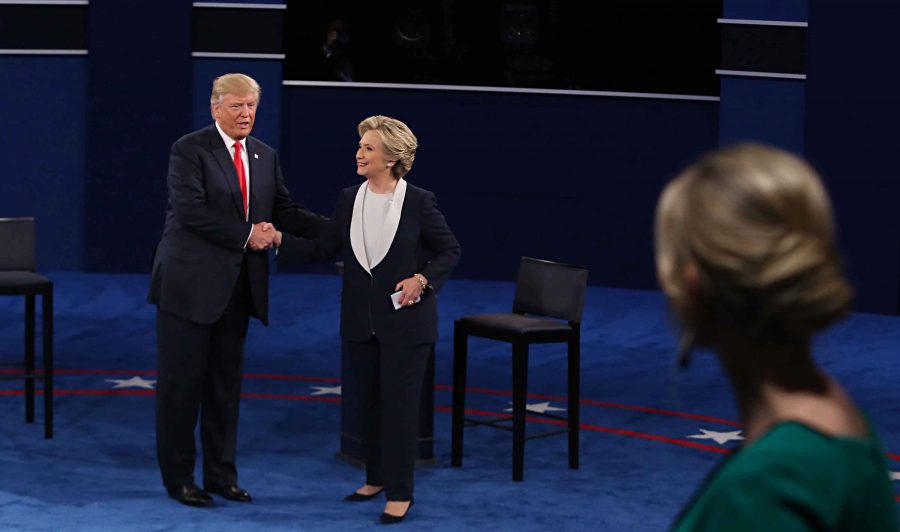Presidential election holds significant consequences for women, SIU experts say
Donald Trump and Hillary Clinton shake hands on stage after the second debate between the Republican and Democratic presidential candidates on Sunday, Oct. 9, 2016 at Washington University in St. Louis, Mo. (Christian Gooden/St. Louis Post-Dispatch/TNS)
October 25, 2016
With the first female major party presidential candidate running against a man many have labeled a misogynist, this year’s election has moved women’s issues into the spotlight.
The two candidates diverge on both the policies and behavior that involve women the most. Three SIU professors weigh in on these issues and the possible effects for women in the aftermath of the election.
Women in politics
Advertisement
Democrat Hillary Clinton’s candidacy alone has great implications for women in the United States, said Diana Tigerlily, a professor in SIU’s women, gender and sexuality studies department.
Tigerlily said when her daughter was younger, she made a point to tell her she could be anything she wanted to be when she grew up.
“But then I wondered if I was lying to her,” Tigerlily said.
She said a Clinton presidency would communicate to younger generations that intelligence and job qualifications matter more than gender.
John Jackson, a visiting political science professor at SIU, said a Clinton presidency could potentially encourage more women to enter politics as well.
According to a report from the Center for American Women and Politics at Rutgers University, women represent fewer than 26 percent of elected officials in state and federal government.
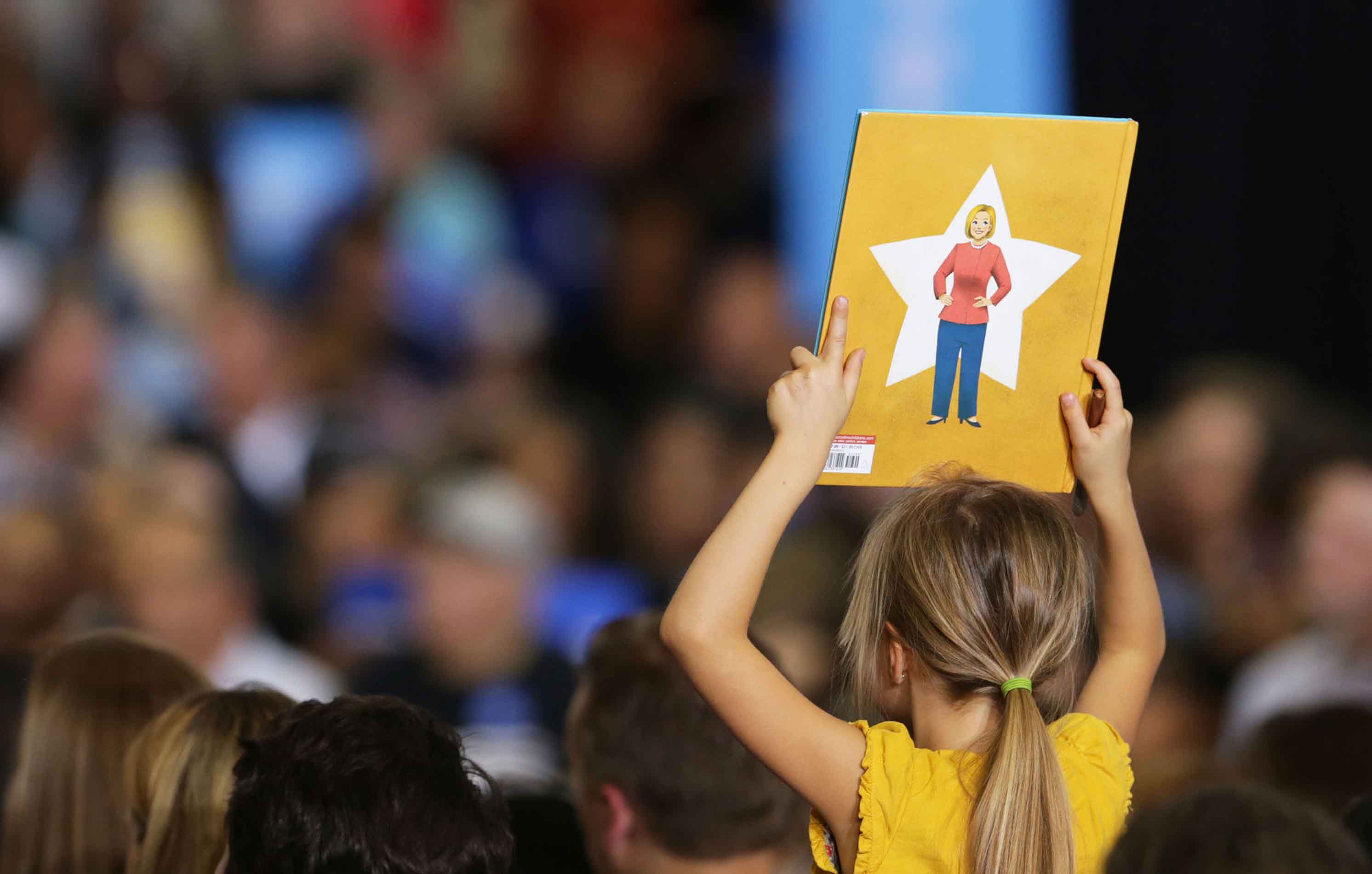
At the state level, women hold 24 percent of executive offices and comprise 25 percent of legislators, according to the report.
Advertisement*
Nineteen percent of U.S. Senators and Representatives are women.
“The idea that it’s a ‘man’s business’ has been deeply ingrained in the American culture,” Jackson said. “But we could certainly see that change with a woman president.”
Reproductive rights
Jackson said one of the biggest concerns for women with this election is the possible overturning of Roe v. Wade.
This landmark 1973 United States Supreme Court case made it unconstitutional for a state to regulate or outlaw abortions, citing a woman’s Fourteenth Amendment right to privacy in making her own medical decisions.
As it stands, the Supreme Court is divided, with four conservative justices and four liberal justices. One seat remains vacant and will be filled by the newly elected president in 2017.
Individual states often try to test their limits on abortion regulations, and these cases wind up in the Supreme Court, Jackson said.
He said if Republican nominee Donald Trump becomes president, the “attack” on Roe v. Wade will continue.
In a September letter to supporters, Trump pledged to appoint anti-abortion Supreme Court justices if elected. He also promised to defund Planned Parenthood, an organization that provides abortion services as well as cancer screenings, STD tests and general healthcare services for women.
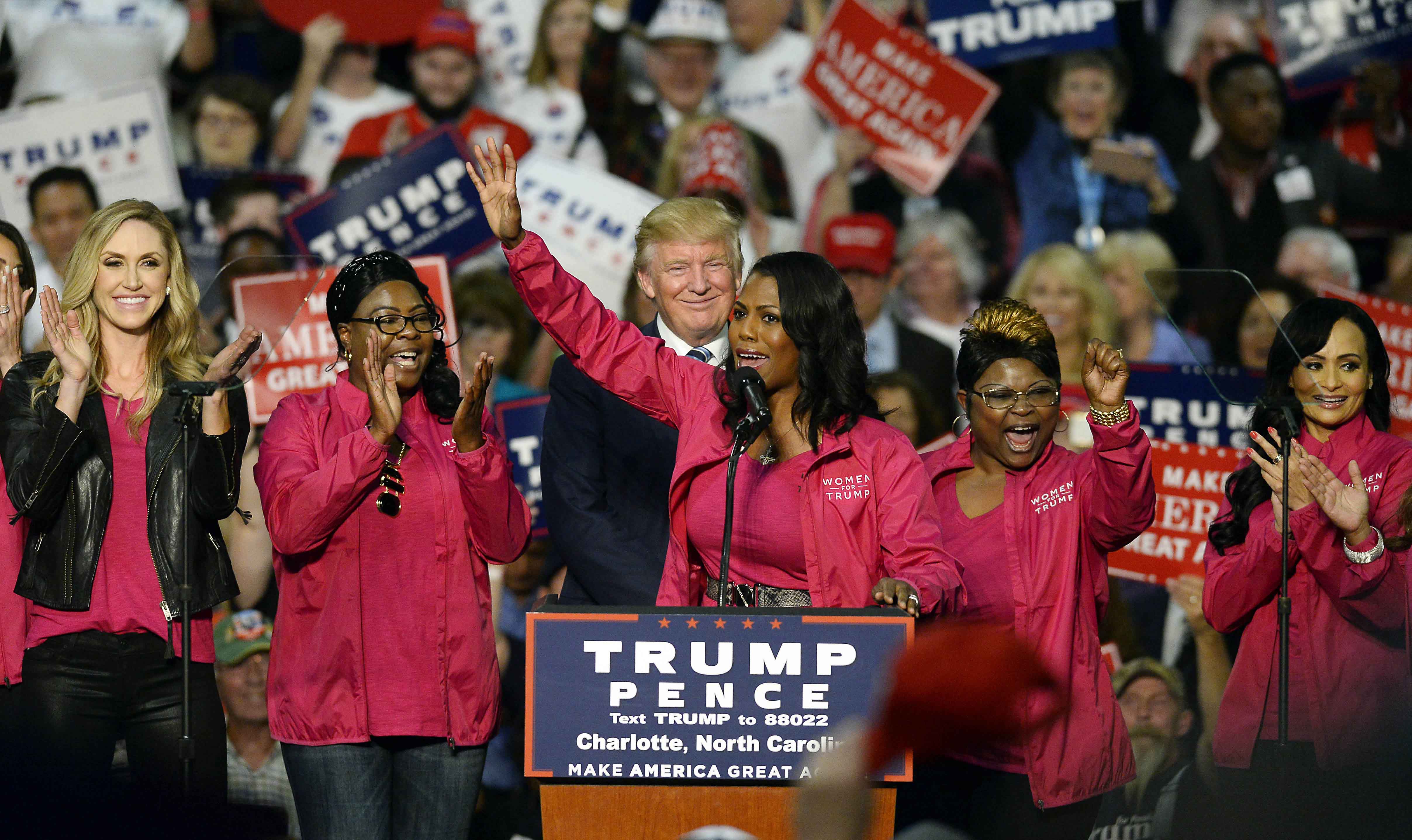
While Trump’s stance on this issue echoes the Republican party line, Clinton’s views on abortion are more leftist than usual Democratic candidates, said Ken Mulligan, a political science professor at the university.
During the final presidential debate, Clinton said she would not support a ban on partial-birth abortions because she does not believe the government should have a hand in making that “heartbreaking” decision for women and their families.
Mulligan said Clinton’s position is “about as extreme as it gets.”
In Tigerlily’s view, Clinton’s support of abortion and Planned Parenthood demonstrates a higher regard for women’s autonomy and reproductive health.
Childcare
Clinton and Trump also differ in their plans for childcare and paid leave.
A Trump presidency would modify the tax code to let parents deduct childcare expenses from their income taxes for up to four children, according to his campaign website.
Sen. Elizabeth Warren, D-Mass., criticized this plan in August, tweeting that it gives “billionaires with nannies a tax break while millions of low-income households get nothing.”
In a September speech, Trump also announced a plan to grant six weeks of paid maternity leave to mothers who receive no such leave from employers. This compensation would be equal to unemployment benefits.
Clinton’s campaign website lays out her proposal, which would guarantee 12 weeks’ leave from work for new parents, and requires that parents are paid 66 percent of their current wages during the time off.
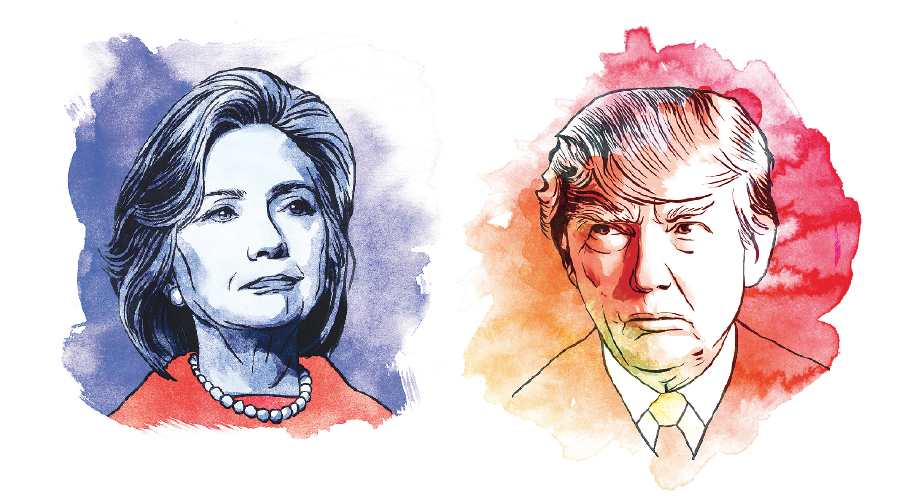
The campaign also unveiled Clinton’s intention to increase the child tax credit to $2,000 for every child 4 years old and under, a deduction she said would help low-income families with rising childcare costs.
The cost of this policy is estimated to be $150 million to $200 million over the course of a decade, which Clinton said she would offset with tax increases for the top 1 percent of income earners.
Obamacare
The two candidates have contrasting strategies for how to proceed with the Affordable Care Act, commonly known as Obamacare, which was signed into law by President Barack Obama in 2010.
This law requires all Americans to have healthcare coverage, and includes subsidies to make insurance more affordable for the low-income population by bringing younger and healthier people into the insurance system, which was designed to reduce premiums. The law also mandates insurers provide options for those with pre-existing medical conditions.
Jackson said the Affordable Care Act is not without its problems. Numerous setbacks and delays have plagued the law’s rollout, including a malfunctioning website and enrollment deadlines being pushed back.
Marketplaces where Americans can compare costs of health insurance providers have experienced rocketing premiums because of insurance companies pulling out of the system, leading to a lack of competitive pricing, The New York Times reported earlier this month.
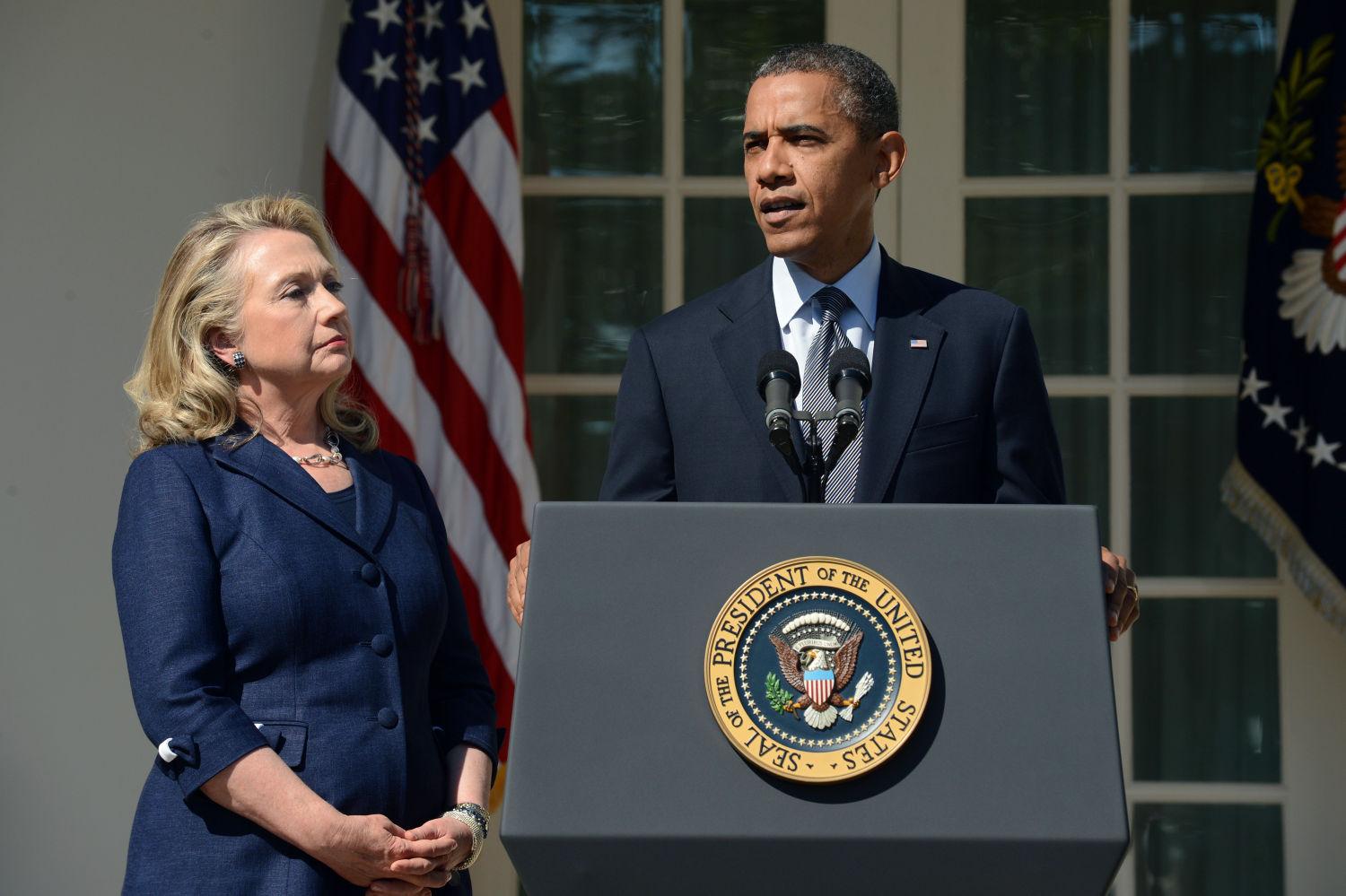
Trump’s plan is to repeal the law and make it so no one is required to buy insurance, according to his campaign website.
The Clinton campaign’s website lays out a plan to reform and expand the existing law rather than eliminate it, citing the 20 million people insured under the healthcare plan as a reason to keep it in place.
Since the passage of the Affordable Care Act, the number of low-income women either going without or delaying medical care has decreased by 3 percent, according to a June 2016 report from the U.S. Department of Health and Human Services.
That same report says there has been a 3.8 percent increase in the number of low-income women with a source of usual care since 2010.
Jackson said because of the law’s problems, Congress must deal with Obamacare in some way regardless of who is elected president. But its termination would have enormous implications for everyone, Jackson said, especially these low-income women who would have to find new sources for insurance.
Personalities
Mulligan said policy stances aren’t the only thing affecting women’s impressions of the candidates.
“This election is a lot more about the candidates’ personalities and weaknesses,” Mulligan said.
Trump, who faces allegations of sexual assault and has come under fire for objectifying women and criticizing their appearances, demonstrates that he does not value women, Tigerlily said.
“He is the most toxic embodiment of masculinity that we have ever seen,” Tigerlily said.
Tigerlily said the way GOP leaders responded to Trump’s actions has connotations of its own.
“[Trump] has made it very clear from the beginning that he is misogynistic and racist and classist and homophobic and ableist,” Tigerlily said. “The majority of the GOP establishment has basically gone along with it.”
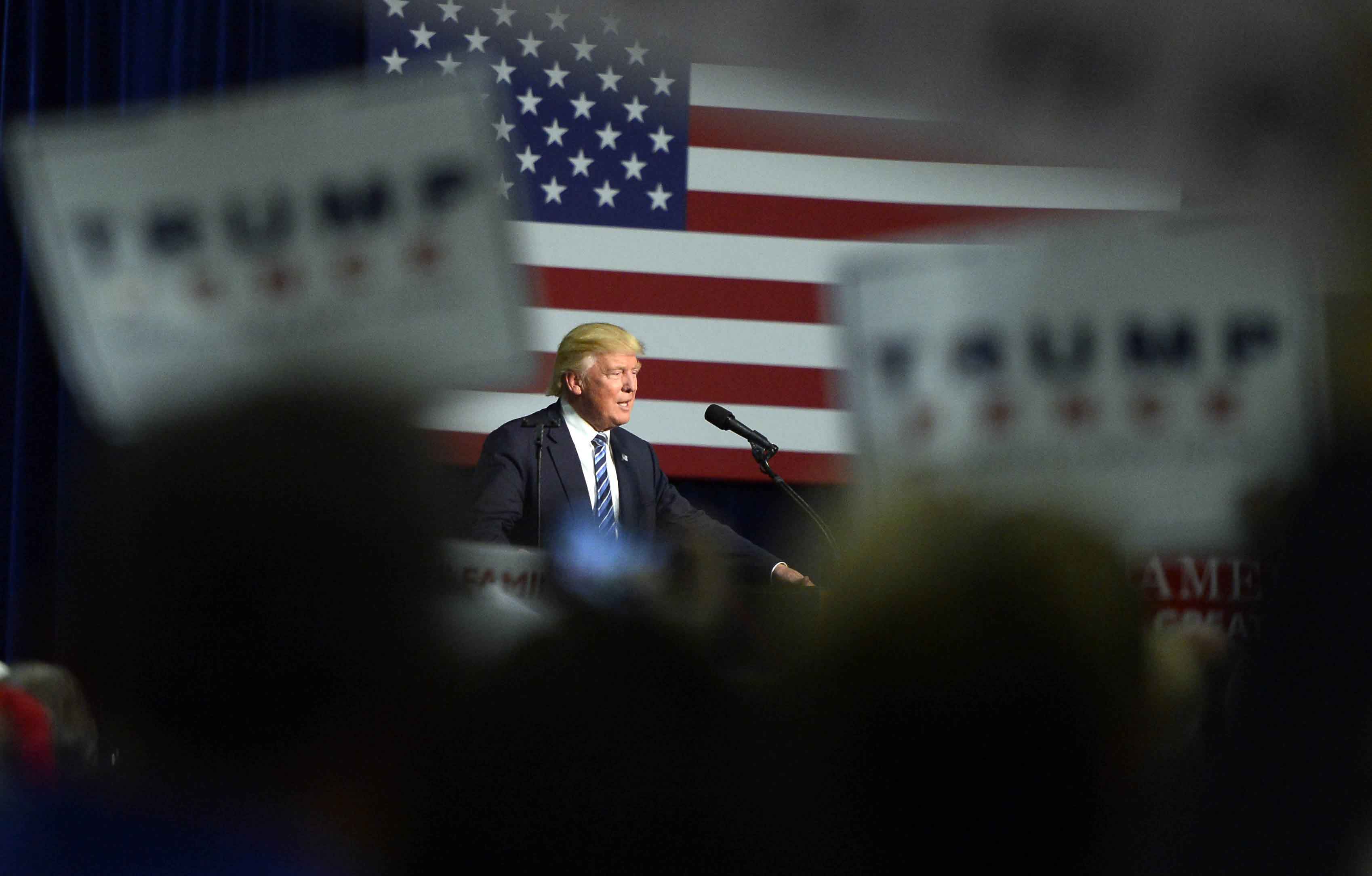
Since The Washington Post published a 2005 video in which Trump speaks about groping women, Trump has been condemned by prominent Republicans such as House Speaker Paul Ryan, Sen. John McCain and Senate Majority Leader Mitch McConnell.
Mulligan said Clinton’s lead with women is not due to any of her own actions. Women are uncomfortable with Trump as a person, he said.
“They don’t feel that he could represent them or be respectful of them and support them as president,” Mulligan said.
Jackson said a Trump presidency’s effect on women is more difficult to predict than a Clinton presidency because his policies tend to be vague.
Tigerlily agreed, and added that although it isn’t entirely clear what may happen if Trump is elected, Clinton would be significantly better for women, she said.
“If [Trump] continues to spew the kind of hatred that he does, I think he will be negatively affecting not only people in the U.S. but also people around the world,” she said. “I find it frightening what he might do.”
Staff writer Marnie Leonard can be reached at [email protected] or on Twitter @marsuzleo.
To stay up to date with all your SIU news, follow the Daily Egyptian on Facebook and Twitter.
Advertisement



